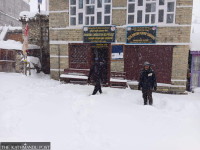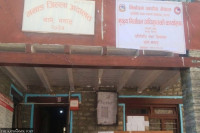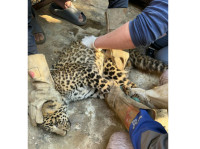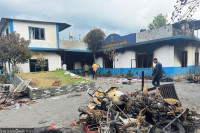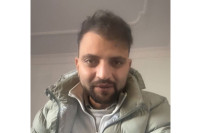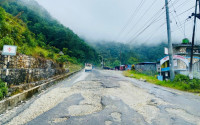Gandaki Province
Vehicles start plying long-haul routes in Kaski, charge exorbitant fares
Although long-distance travel remains banned, both private and public vehicles are moving in and out of Pokhara with passengers.
Deepak Pariyar
Restrictions on long-haul travel for passengers across the country are still in place even after the nationwide lockdown was lifted in July. However, in Pokhara, public buses have not only begun ferrying passengers on long-distance routes, but also charging them double the fare.
Sajjan Kumar Singh paid double the normal fare to travel from Baglung to Pokhara on Wednesday on a jeep belonging to Baglung Bhagawati Transportation Pvt Ltd. “The driver said passengers will have to foot the bill for the travel permit,” he said. The other six passengers on the vehicle had requested the vehicle operator to charge normal fares, but their request went unheard, said Singh. “The normal fare is Rs 400 but we were asked to pay Rs 1,000.”
All seven seats on the jeep were filled, leaving little room for physical distancing, he said. “My father needs to get his monthly medical check up done in Pokhara. I had no option but to pay extra to travel at a time like this,” said Singh. “I had inquired with the District Administration Office in Baglung about travel passes, and was informed that the office does not charge for travel passes. The drivers are taking advantage of people like us to earn quick money.”
Ram Bahadur Gurung, a jeep driver working on the Pokhara-Baglung route, said the fare hike was needed as drivers and vehicle owners are taking huge risks to help people in immediate need of transport. “Some people need to be taken to hospitals for immediate medical attention, others have to get back to work,” said Gurung. “We are helping them by risking our lives driving along the landslide-ridden Prithvi Highway amid this pandemic,” he said.
While there’s a complete ban on public vehicles ferrying passengers on long routes; private vehicles need to seek permission from authorities to cross district borders. But in Pokhara, both passenger and private vehicles with travel passes from the District Administration Office have begun ferrying passengers in and out of the city.
Yogendra KC, chairman of Prithvi Highway Bus Transportation Company, agreed that public buses are leaving and entering Pokhara on a daily basis with passengers. But he was quick to add that private vehicles are also providing transportation facilities to passengers at a price. “A few public buses have been running on long routes along the Prithvi Highway everyday after acquiring travel permission from the district administration office,” he said. “Bus owners themselves are driving these vehicles since they have sought permission from the District Administration Office under various pretexts. It is true that they are charging passengers double the normal fare.”
According to the Kaski District Administration Office, around 60 vehicles are given travel passes for Kathmandu every day. An equal number of vehicles seek passes for other districts. "We don't have any policy of issuing travel passes to passenger buses. And other district administrators have also not asked us to allow the entry of public vehicles from their districts to ours," said Shreenath Paudel, assistant chief district officer.
According to him, around 60 percent vehicle owners seek permission for medical treatment purposes, 20 percent for other essential services and the remaining for other emergencies. “We, however, haven’t issued passes to vehicles to ferry passengers,” he said.
The surge in the number of vehicles on long-distance routes has also been attributed to travel permits issued by local governments. Most local governments in Tanahun, Gorkha, and Baglung have been found issuing travel passes to passenger buses and private vehicles. “The travel passes issued by local governments are valid for upto a week and these vehicles are only supposed to use the vehicle for the specified purpose,” said Paudel.
With vehicles operating on long-distance routes, officials are worried about its impact on the district’s effort to curb the spread of coronavirus. “Chances of Covid-19 transmission are elevated as these vehicles operating illegally don’t take safety measures while ferrying passengers,” said Baburam Acharya, chief at Kaski District Health Office. “Officials don’t screen passengers entering the district on these vehicles. This is likely to spell trouble for the entire district.”
The local administration set up health desks at major entry points of the district, but they were removed after the nationwide lockdown was lifted.
Acharya said the health office has so far not received any official communication from the authorities about setting up of health desks at entry points again. "Although it is becoming increasingly necessary to keep an eye on people entering and leaving the district, our office does not have the human resources to run the health desks,” he said. “All our efforts and resources are currently focussed on contact tracing."
KC from Prithvi Highway Bus Transportation Company claimed that private vehicles are misusing the travel permission more than public ones. "Some vehicles with private number plates are illegally operating as public vehicles,” he said, “They are now taking advantage of the situation and ferrying passengers on long-haul routes.”
However, Santosh Roka, chief at the Kaski District Police Office, refuted such claims. According to him, his office is not aware of either public or private vehicles operating on long routes along the Prithvi Highway.
"Some buses go to Kathmandu to bring people from holding centres where they are kept after returning from abroad. They bring people from Kathmandu by following the safety protocol," said Roka.
According to him, even within the district, vehicles are only allowed to have one passenger for every two seats. "We seize any vehicle not following the rule," he said.




 20.12°C Kathmandu
20.12°C Kathmandu.jpg)
